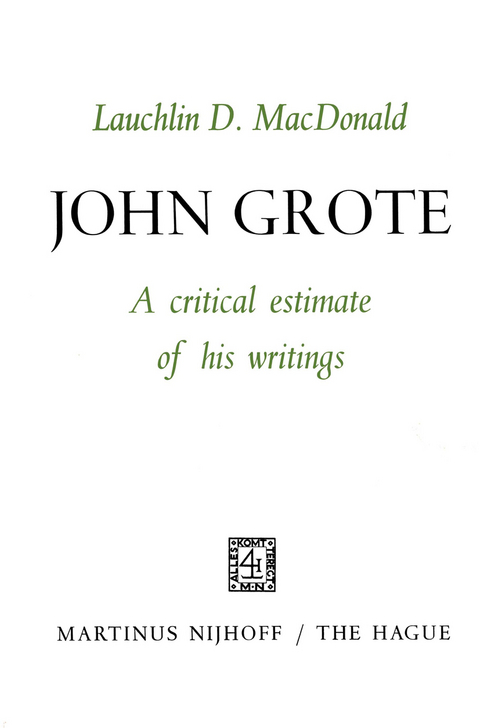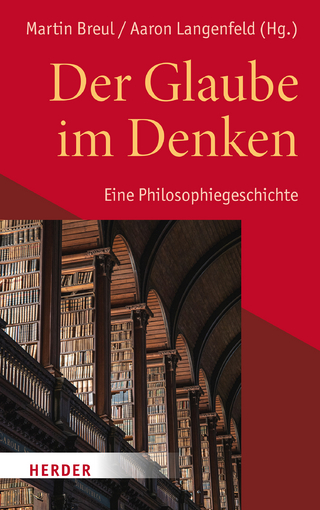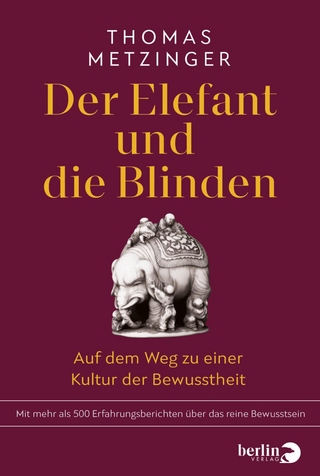
John Grote
Springer (Verlag)
978-94-011-8504-2 (ISBN)
I. Introduction.- 1. John Grote’s Life.- 2. Writings.- 3. Statement, and Division, of the Problem.- 4. Survey of Sources and of Previous Work on the Problem.- 5. Transition to Next Chapter.- II. Grote’s View of Phenomenalism.- I. Distinction of Terms: ‘Noumenon,’ ‘Phenomenon,’ and ‘Thing in Itself’.- 2. What Phenomenalism Means.- 3. Phenomenal Reality.- 4. Two Tests of Phenomenalism.- 5. The Phenomenalist Spirit or Mind.- 6. Summary and Foreword to Next Chapter.- III. Grote’s Interpretation of the Relation of Phenomenalism to Philosophy.- 1. Each is Necessary to the Other.- 2. Consciousness as Active and Passive.- 3. Analysis of Sensation.- 4. Time and Space.- 5. The Relationship of Phenomenalism to Philosophy Further Illustrated.- 6. Relationship Through Contrast.- 7. Mind Provides Unity.- 8. Grote Avoids A Basic Blunder in Behaviorism.- 9. Kant’s Abstraction of Phenomenal Reality from Reason.- 10. Abstracting of Consciousness from Phenomena is Unwarranted.- 11. Historical Recapitulation.- 12. Main Contribution of the Chapter, with Comment.- 13. Transition to Next Chapter.- IV. Philosophy As Consciousness and the Ego.- 1. Introduction.- 2. Ferrier’s Treatment of Philosophy and Phenomenalism.- 3. Criticism of Grote and Ferrier on the Basis of Lotze’s Position.- 4. Meaning of ‘Know,’ and ‘Know About,’ in Reference to Phenomenal Reality.- 5. Relativity of Knowledge.- 6. Summary of Main Issues.- V. ‘Philosophy’ and the Scale of Sensation.- 1. Introduction.- 2. Importance of the Scale of Sensation.- 3. Two Kinds of Knowledge — ‘Higher’ and ‘Lower’.- 4. Hamilton, Mill and Reid Compared.- 5. Descartes and Hamilton.- 6. Proper Use of Certain Terms in Relation to the Scale of Sensation.- 7. Critical Reflection on the ForegoingChapter.- VI. Phenomenalist Logic and Knowledge.- 1. Introductory.- 2. Grote’s Own Position Revealed Through Criticism of Hamilton and Mill.- 3. Phenomenalism Inadequate For A Perfect Scheme of Knowledge.- 4. Critical Observations and Analyses.- VII. The Introspective Method in Knowledge.- 1. Introduction.- 2. Locke’s Psychology.- 3. Hume’s Rationalism.- 4. Berkeley’s Subjectivism.- 5. Spencer’s and Morell’s Evolutionism.- 6. Retrospect and Prospect.- VIII. Immediateness and Reflection.- 1. Introduction.- 2. Purpose of the Chapter in Introducing These Terms.- 3. Meaning of Immediateness and Reflection.- 4. Significance of Immediateness and Reflection in Grote’s Philosophy.- 5. Critical Comment.- 6. Relation to the Following Chapter.- IX. Personalism in Grote’s Writings.- 1. Introduction.- 2. Epistemological Monism.- 3. Monistic, Pluralistic, and Theistic Personalism.- 4. Critique of Materialism.- 5. Critical Comment.- 6. Summary and Transition to Next Chapter.- X. Grote’s Idealism.- 1. Introduction.- 2. Grote’s Platonism.- 3. Critique of Utilitarianism.- 4. A Critique of Moral Ideals.- 5. Critical Remarks.- 6. Concluding Note to this Chapter.- Conclusion.- 1. Grote’s Position in the History of Philosophy.- 2. Further Critical Comment.- Appendix: An Exposition of the Miscellaneous Writings of John Grote.- I. “On A Furture State”.- 1. Glorification of body and mind.- 2. Simplicity of style and thought in this article.- 3. Effect of present life on the future.- 4. Manner of individual appearance in a future life is unimportant.- 5. Stress on the importance of both present and future life.- 6. Comment.- II. “On Glossology”.- 1. Concerning terminology.- i. Break in Grote’s projected work on glossology.- ii.’ Phone’ and ‘noem’.-iii.’ Phonism’ and ‘noematism’.- iv. Ideas of physical ‘things’.- v. Stomatism.- vi. ‘Hypophonism’.- 2. The philosophy of language.- i. Four divisions.- ii. ‘Noematism’.- iii. ‘Noematoschematism’.- iv.’ Phonarium’.- v. ‘Dianoematism’.- vi. In extreme cases the modification in noematism is very great.- 3. Criticism of Tooke.- 4. Criticism of Trench.- 5. Comment.- III. “Thought vs. Learning”.- 1. A contrast.- 2. Use of one’s own mind is of chief importance.- 3. Thought and learning stagnation.- 4. Comment.- IV. “Pascal and Montaigne”.- 1. A brief comparison.- 2. Pascal’s devotion to religion.- 3. Montaigne’s neopaganism.- 4. Pascal on happiness.- 5. Comment.- V. “On the Dating of Ancient History”.- 1. Dating of events by two methods — epochal and eponymous.- 2. Dynastical reckoning.- 3. Olympiadic dating.- 4. Dating by lunar months.- 5. Dating originating in Christendom.- 6. Other methods of dating.- 7. Present and future methods of dating.- VI. “Origin and Meaning of Roman Names”.- 1. Significance of ‘nomen,’ ‘praenomen,’ and ‘cognomen’.- 2. Criticism of Plutarch.- 3. Change in a Roman name.- 4. Criticism of Varro’s view.- 5. Present-day names based on Roman rather than on Greek.- VII. Conclusion to Miscellaneous Writings.- Chronological Bibliography of the Writings of John Grote.- General Bibliography.
| Zusatzinfo | 1 Illustrations, black and white; XXI, 284 p. 1 illus. |
|---|---|
| Verlagsort | Dordrecht |
| Sprache | englisch |
| Maße | 155 x 235 mm |
| Themenwelt | Geisteswissenschaften ► Philosophie ► Geschichte der Philosophie |
| Geisteswissenschaften ► Philosophie ► Philosophie der Neuzeit | |
| Sozialwissenschaften ► Kommunikation / Medien ► Kommunikationswissenschaft | |
| Sozialwissenschaften ► Pädagogik | |
| Sozialwissenschaften ► Soziologie ► Spezielle Soziologien | |
| ISBN-10 | 94-011-8504-2 / 9401185042 |
| ISBN-13 | 978-94-011-8504-2 / 9789401185042 |
| Zustand | Neuware |
| Haben Sie eine Frage zum Produkt? |
aus dem Bereich


